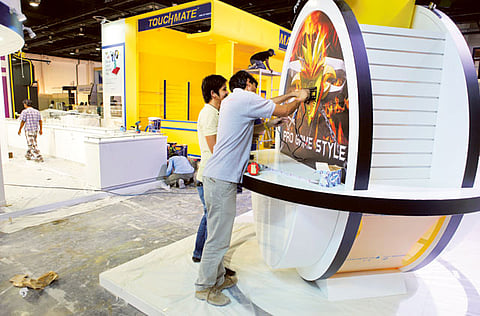Region’s largest IT exhibition opens doors
Trending technologies, product launches and top industry forums to set agenda

Dubai: Techies in the Middle East will turn their attention to the new technologies and products to be showcased at the five-day Gitex Technology Week, one of the top three ICT (information, communication and technology) shows in the world, which begins on Sunday.
“Launched in the dynamic Middle East market more than three decades ago, the event has risen to be the pivotal platform where the latest developments in the ICT industry are unveiled to the world and the region. This year, the event witnesses an even wider global presence. Gitex Technology Week plays a key role in connecting leading global ICT companies to come together and further boost the strong market confidence to stimulate business investment,” Helal Saeed Al Merri, chief executive officer, Dubai World Trade Centre, said.
Leading movers and shakers from the world’s tech community are participating in the event.
“More than 80 per cent of leading ICT brands will be present at the show, with C-level executives in attendance representing ICT budgets of over $50 billion [Dh183.6 billion],” Trixee Loh, senior vice-president at Dubai’s World Trade Centre, said. “With the co-location of ITU Telecom World 2012 and InfoComm MEA 2012, we can expect a much higher number of regional visitors to Gitex this year.”
Organisers are expecting around 140,000 visitors from 144 countries to pass through the doors this week to hear corporate chieftains of multi-billion corporations discuss strategies regarding technologies that have changed the way we live. More than 3,500 companies from 54 countries will showcase their products at the 32nd IT expo.
New participants
New countries to take part this year are Algeria, Denmark and New Zealand.
Repeat attendance by exhibitors over the years has ensured that the largest technology fair in the Middle East and beyond continues to attract top players in the industry.
Visitors to Etisalat and du stands are expected to experience the roll-out of new technologies by the operators apart from a range of promotional offers.
Gitex will present the latest and most advanced cyber security measures and world renowned authorities will share insights, experiences plus live demonstrations on how to defend against cyber attacks in real time.
Organisers estimate that 1,000 launches will take place during the show. Among the most eye-catching is the official launch of a partnership between hip hop star — 50 Cent — and UAE-based company Shift LLC on Wednesday. The rapper is set to appear for the official launch of SMS Audio headphones.
Preview of Windows 8
Microsoft will preview its new operating system — Windows 8 — and several locally relevant applications.
According to IDC’s study, the world created 1.8 zettabytes (1.8 trillion gigabytes) of digital information last year. Over the next decade, the amount of information managed by enterprise data centres will grow 50 times in size, and the number of files at data centres will grow 75 times.
According to a Cisco report, Middle East and Africa will have the highest regional mobile data traffic growth rate over the next five years. The report projected that mobile cloud traffic globally will account for 71 per cent or 7.6 exabytes per month by 2016 when compared to the 45 per cent or 269 petabytes per month in 2011.
Worldwide mobile data traffic would increase 18-fold over the next five years, reaching 10.8 exabytes per month or an annual run rate of 130 exabytes by 2016.
Africa and Middle East would have the highest regional mobile data traffic growth rate with a compound annual growth rate (CAGR) of 104 per cent, or 36-fold growth. The expected sharp spike in mobile traffic is due, in part, to a projected surge in the number of devices connected to the internet, which will exceed the number of people on earth (2016 world population estimate of 7.3 billion according to the United Nations).



